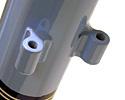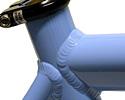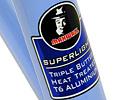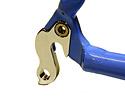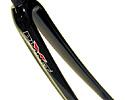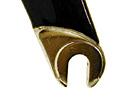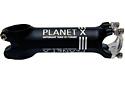
Recently on Cyclingnews.com |
On test: Planet X Superlight, February 12, 2006
Great but affordable
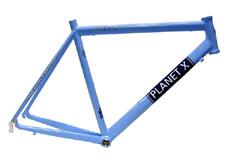
|
Taking a break from the usual parade of carbon fiber wonderbikes, John Stevenson finds a lot to like in a far more affordable aluminium machine from the UK.
Does a frame have to cost a month's salary to have a chance of being classed as great? You could easily get the impression, confronted by the stratospherically-priced carbon and unobtainium wonderframes the bike industry has treated us to in the last few years, that the answer was "yes; if you want a fantastic frame, you will have to survive on lentil soup this month." The Planet X Superlight turns out to have a different answer: "No, you can have a very nice frame for a reasonable price if you can live without mega lightness or Italian mystique."
Planet X hails from the UK, though, like all the company's frames, forks and other components, the Superlight Team is made in Taiwan to specifications developed as a result of the company's long involvement with several top British road racers. The result of that experience is a butted aluminium frame with a geometry that's intended for long days in the saddle and crummy conditions.
The Superlight's tubing is Planet X's 'Max Wall' pipe, a reference to a cult British comedian of more than a few years ago, and the bare frame weighs a respectable but not spectacular 1450g. Our Superlight came with Planet X's all-carbon fork, at a weight (380g) that falls into the same category, and a suite of other Planet X goodies: bar, stem, saddle and seatpost. We added the Ultegra group reviewed here and a pair of Dura-Ace wheels and away we went.
|
|
|
|
|
|
|
|
|
|
|
|
|
|
|
Planet X describes the Max Wall tubing as 'triple butted' which is bike maker code for tubing that has thicker walls at the ends than in the middle, and with different butt thickness at the ends. (A tube that's the same increased thickness at both ends is 'double butted' while one that's thicker at just one end is 'single butted' - seat tubes are often single butted with the thicker segment at the bottom bracket end.)
Chatting with Planet X's Dave Loughran, a straight-talking former racer himself from the North of England, Loughran hinted at a future carbon Planet X with round tubes - so why the teardrop-shaped top and down tube on the Superlight Team?
"The only rationale is that its pretty much the lightest aluminium triple butted tubeset that is available," said Loughran, "very light, not superstiff as aluminium can be a harsh ride."
Aside from the shaped tubes, the Superlight is quite short on flash and features. A couple of threaded bosses on the down tube provide a place to route the gear cables, the rear gear hanger is removable, and so is the seat collar, and that's it. There are practical reasons for this minimalism though. Loughran says there's no front derailleur boss to provide "more adjustability", for example. The seat clamp is an external, removable piece so if you get over-enthusiastic with the Allen key and strip it out, it's easily replaced; that's a feature pro mechanics are always pleased to see and indicates Planet X's legacy of developing bikes for top UK pros.
"Mark Lovatt and John Tanner have raced this frame with great success in the UK's top races," says Loughran, "and we love to see our frame competing against and beating the Litespeeds and Pinarellos."
The Superlight's geometry is a classic long-top-tube stage race layout, which we complemented with a 120mm Planet X stem and Planet X's Probe seatpost, which has a fairly standard amount of setback, for a relaxed riding position, comfortably centered on the bike and tidily suspended between saddle and bars.
Our Planet X was a size L with a nominal 54cm seat tube, 57cm top tube, and 73° seat angle, I've always liked longer bikes and I felt right on the Superlight straight away. If this were a custom frame, I wouldn't change anything in the main numbers, though there's a couple things I would tweak - more of that later.
The ride
As Loughran rightly points out, aluminium frames can feel harsh. The Planet X Superlight Team avoids this by using moderately sized tubes, so that each pipe isn't a sounding board that reverberates with every bump and edge you ride over. The result is a bike that feels quiet - the Planet X doesn't rattle your fillings out on rough roads and it's not fatiguing on longer rides.
Of all the bikes I've ridden in the last few years, the Planet X reminds me most of the Trek Madone. Not in weight - the Madone had the advantage there by a few hundred grams of frame and fork and over a kilogram of complete bike - but in manners. Like the Madone, the Planet X is a neutral-handling, get-you-home bike that has no nasty surprises lurking at the extremes of its handling characteristics. It's steady on the flat, dips evenly and calmly into turns at any speed and descends with aplomb.
As usual, climbing was limited by your humble scribe's talent and (lack of) fitness, far more than by the bike. If I were a talented climber then I'd want something lighter to maximize the advantage of that talent, but I'm prepared to sacrifice that for the Superlight Team's sheer value for money. You just don't get frames for this price that will easily build into UCI-weight-limit-busters.
Aluminium frames are traditionally somewhere between very stiff and extraordinarily stiff. That's an advantage when you're putting the power down, but a disadvantage when every tiny bump is telegraphed undamped and unfiltered through the frame to your backside. By using frame tubes that aren't too large, Planet X has avoided this. The Superlight is still stiff enough that it doesn't deflect under hard pedaling or exhibit unpredictable handling - but it doesn't hammer you either.
The sum total of these traits is a bike that's just downright welcoming and enjoyable to ride. It's fuss-free, comfortable, unpretentious and simply right.
That Planet X can build a frame that costs this little and is still this much fun to ride has a couple of other advantages too. Firstly, you're not going to be heartbroken if you crash it and write it off - a risk for anyone who does a lot of riding. And for me, there's another bonus: I don't feel like this bike is "too good" for me. Buzzing around the streets on carbon fiber wonderbikes, I'm always aware that I'm a late-30-something who loves to ride and tinker with bikes, but who has never had the dedication to get seriously fit. Like the Ultegra group we hung on it, the Planet X has the right price/performance level for me.
Speaking of price/performance ratios some of the Planet X components that came with the frame are significant bargains too. The 3D Forged four-bolt stem is light, simple, and costs just UKP35. The Probe Pro seat post has a two-bolt adjustment and will cost just 25 of your English pounds. You get the idea.
I said earlier I'd like a couple of changes. Well, perhaps not changes exactly, but options. The Superlight is such a well-behaved frame that I want to use it every day, in all conditions, for fun rides on quiet roads and for the dash into the office. What I'd like a version with longer chainstays and clearance for fatter tyres so I could easily swap wheels for the daily commute run. However, I'm totally out of step with mainstream thinking here, which seems to be to make all clearances and spaces in a road bike frame as minimal as possible.
Conclusion
That niggle aside, the Planet X Superlight Team is a sweet-handling and extremely affordable aluminium frame that would serve just as well as a number two bike for training or, with better spec, as your number one bike for racing. And if you slide it down the road, you won't need to take a third job to replace it.
Price: UKP375 with full carbon fork, headset & seat clamp
Weight: 1450g
Pros: Pro-tuned, all-day handling; bargain price
Cons: Not the lightest, but for this money, who's complaining?
More information: www.planet-x-bikes.com
Cyclingnews rating: ![]()

